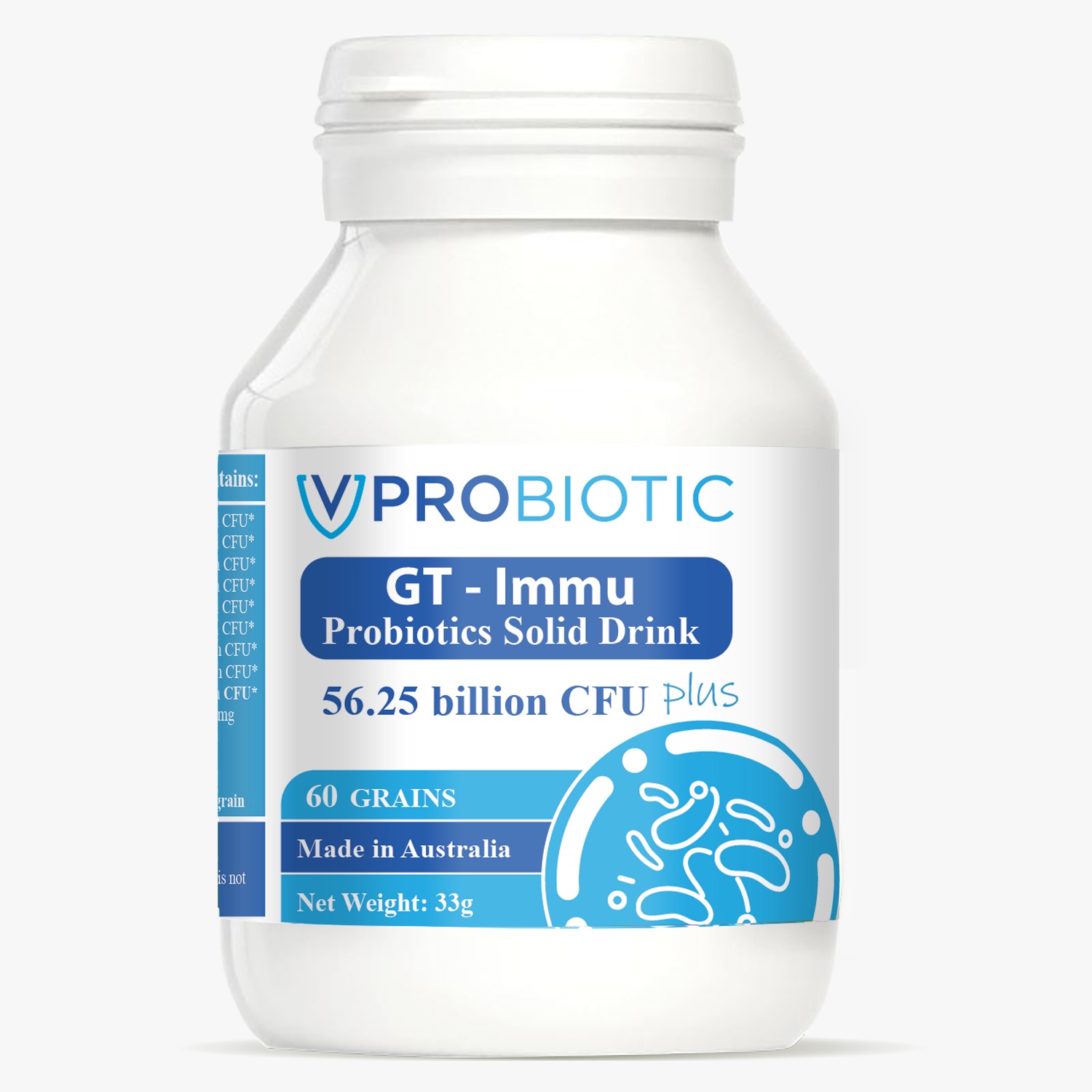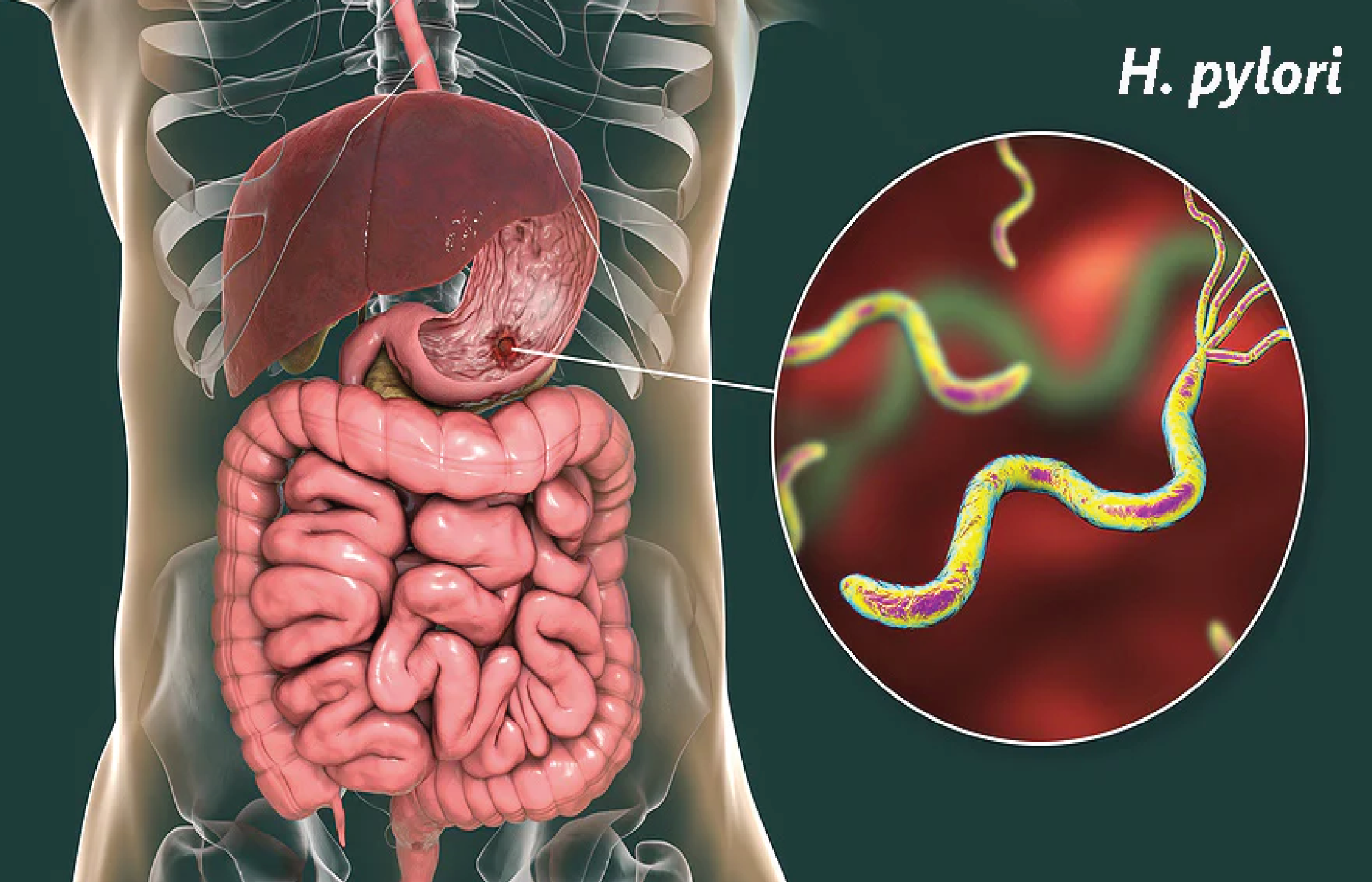
GT-IMMU
PROBIOTICS CAPSULES
30s/60s
If you’re experiencing typical H. pylori pain, heartburn, or ulcer symptoms, or you’ve tried to treat H. pylori without success, you’ll be glad to know that probiotics can be a simple and effective help. Surprisingly, various probiotic strains have emerged that can prevent H. pylori infection, significantly increase the success of H. pylori treatment, and sometimes even lead to a complete cure.
INGREDIENTS
Each capsule contains:
| Lactobacillus acidophilus | 1.5 billion CFU* |
| Lactobacillus casei | 4.5 billion CFU* |
| Lactobacillus delbrueckii subsp. Bulgaricus | 3.5 billion CFU* |
| Lactobacillus plantarum | 3 billion CFU* |
| Bifidobacterium longum | 4 billion CFU* |
| Bifidobacterium infantis | 5 billion CFU* |
| Bifidobacterium breve | 4.5 billion CFU* |
| Streptococcus thermophilus | 30 billion CFU* |
| Total | 56.25 billion CFU* |
| Galacto-Oligosaccharides (Prebiotic) | 100mg |
* CFU: Colony Forming Units
HOW TO EAT:
Adults take 1 vegetarian capsule daily with water, or as directed by your health professional.
WARNINGS:
Do not consume if the label seal around cap is broken or removed.
STORAGE INSTRUCTIONS:
Store in a dry place away from direct sunlight. Use within 3 months of opening. No refrigeration required. Keep out of reach of children.
Pregnancy and breast-feeding: The product can be used during pregnancy and breast-feeding.

KEY BENEFITS
- One capsule consists of a minimum of 56.25 Billion CFU
- Probiotics compete directly with H. pylori and help restore the gut microbial environment
- Support everyday health and wellbeing
- Maintain immune system health
- Support the intestinal microbiome
- Support healthy bowel function
- Beneficial for the treatment of diarrhea, gastroenteritis, atopic eczema, and colic.
L. = Lactobacillus
Mostly found in such as the digestive system, urinary system, and genital system
B. = Bifidobacterium
Bifidobacteria are one of the major of bacteria that make up the gastrointestinal tract
S. = Streptococcus thermophilus
Streptococcus thermophilus is a type of probiotic (“good” bacteria) found in the digestive tract. It produces lactic acid in the gut.
CFU = Colony Forming Units
Unit of measurement used for probiotics and other bacteria.
GT-IMMU FAQ
Should I take probiotics while being treated for H. pylori?
Moreover, colonization of specific probiotics in gastric likely maintain the balance of the gastric microbiota. Therefore, probiotic supplementation is effective for maintaining both the gastric and gut microflora during H. pylori infection and antibiotic therapy.
When is the best time to take probiotics?
Taking them before breakfast may be the preferred option, because your digestive system has been at rest for an extended period of time and the probiotic has less resistance reaching the intestines.
How many days does it take to get rid of H. pylori?
Most people are cured after finishing two weeks of medicine. Some people need to take another two weeks of medicine. It is important to finish all of the medicine to ensure that the bacteria are killed.
Can probiotics heal stomach lining?
Probiotics are a key approach to healing leaky gut and can repair the gut lining, reduce inflammation, and restore the gut microbiome. Probiotic supplements help reduce symptoms associated with leaky gut syndrome, including bloating, abdominal pain, stool changes, fatigue, and brain fog.
How long does it take for probiotics to work?
It takes most people 2 to 3 weeks to feel significant benefits when they start taking probiotics. That’s because probiotics need time to accomplish their three key goals: increase your good bacteria count, decrease your bad bacteria count, and reduce inflammation.
Why take probiotics before bed?
It’s generally recommended that you take probiotics before bedtime. This gives the beneficial bacteria time to colonize in your gut overnight. When you sleep, your body’s digestive system slows down.
What are the benefits of GOS prebiotics?
Giving a formula that contains prebiotics, including GOS, to infants with colic might help reduce crying. Inability to properly digest the sugar lactose (lactose intolerance). Taking GOS by mouth might improve symptoms like stomach pain, cramps, and bloating in people who are lactose intolerant.
Is Galactooligosaccharides good for you?
Galacto-oligosaccharides pass undigested into the colon where they increase bowel mass and promote growth of certain bacteria that are thought to be beneficial.
REFERENCES:
1. de Brito BB, da Silva FA, Soares AS, et al.: Pathogenesis and clinical management of Helicobacter pylorigastric infection. World J Gastroenterol. 2019, 25:5578-89. 10.3748/wjg.v25.i37.5578
2. Goderska K, Agudo Pena S, Alarcon T: Helicobacter pylori treatment: antibiotics or probiotics . Appl Microbiol Biotechnol. 2018, 102:1-7. 10.1007/s00253-017-8535-7
3. Chen L, Xu W, Lee A, et al.: The impact of Helicobacter pylori infection, eradication therapy and probiotic supplementation on gut microenvironment homeostasis: an open-label, randomized clinical trial.EBioMedicine. 2018, 35:87-96. 10.1016/j.ebiom.2018.08.028
4. Eaton KA, Morgan DR, Krakowka S: Motility as a factor in the colonisation of gnotobiotic piglets by Helicobacter pylori. J Med Microbiol. 1992, 37:123-7. 10.1099/00222615-37-2-123
5. Clyne M, Ocroinin T, Suerbaum S, Josenhans C, Drumm B: Adherence of isogenic flagellum-negative mutants of Helicobacter pylori and Helicobacter mustelae to human and ferret gastric epithelial cells. Infect Immun. 2000, 68:4335-9. 10.1128/IAI.68.7.4335-4339.2000
6. Aizawa SI, Harwood CS, Kadner RJ: Signaling components in bacterial locomotion and sensory reception . J Bacteriol. 2000, 182:1459-71. 10.1128/JB.182.6.1459-1471.2000
7. Food and Agriculture Organization of the United Nations (FAO). In: Encyclopedia of Global Health . (2008).Accessed: June 1, 2022: http://dx.doi.org/10.4135/9781412963855.n464.
8. Lionetti E, Indrio F, Pavone L, Borrelli G, Cavallo L, Francavilla R: Role of probiotics in pediatric patients with Helicobacter pylori infection: a comprehensive review of the literature. Helicobacter. 2010, 15:79-87.10.1111/j.1523-5378.2009.00743.x
9. Lesbros-Pantoflickova D, Corthésy-Theulaz I, Blum AL: Helicobacter pylori and probiotics . J Nutr. 2007,137:812S-8S. 10.1093/jn/137.3.812S
10. Batdorj B, Trinetta V, Dalgalarrondo M, et al.: Isolation, taxonomic identification and hydrogen peroxide production by Lactobacillus delbrueckii subsp. lactis T31, isolated from Mongolian yoghurt: inhibitory activity on food-borne pathogens. J Appl Microbiol. 2007, 103:584-93. 10.1111/j.1365-2672.2007.03279.x
11. Felley C, Michetti P: Probiotics and Helicobacter pylori. . Best Practice Res Clin Gastroenterol. 2003, 17:785-91. 10.1016/s1521-6918(03)00070-2
12. Guruge JL, Falk PG, Lorenz RG, et al.: Epithelial attachment alters the outcome of Helicobacter pylori infection. Proc Natl Acad Sci U S A. 1998, 95:3925-30. 10.1073/pnas.95.7.3925
13. Çekin AH, Şahintürk Y, Akbay Harmandar F, Uyar S, Yolcular BO, Çekin Y: Use of probiotics as an adjuvant to sequential H. pylori eradication therapy: impact on eradication rates, treatment resistance, treatment related side effects, and patient compliance. Turk J Gastroenterol. 2017, 28:3-11. 10.5152/tjg.2016.0278
14. Oh B, Kim BS, Kim JW, et al.: The effect of probiotics on gut microbiota during the Helicobacter pylori eradication: randomized controlled trial. Helicobacter. 2016, 21:165-74. 10.1111/hel.12270
15. Losurdo G, Cubisino R, Barone M, Principi M, Leandro G, Ierardi E, Di Leo A: Probiotic monotherapy and Helicobacter pylori eradication: a systematic review with pooled-data analysis. World J Gastroenterol. 2018,24:139-49. 10.3748/wjg.v24.i1.139
16. Dore MP, Cuccu M, Pes GM, Manca A, Graham DY: Lactobacillus reuteri in the treatment of Helicobacter pylori infection. Intern Emerg Med. 2014, 9:649-54. 10.1007/s11739-013-1013-z
17. Yuan Z, Xiao S, Li S, et al.: The impact of Helicobacter pylori infection, eradication therapy, and probiotics intervention on gastric microbiota in young adults. Helicobacter. 2021, 26:e12848. 10.1111/hel.12848
18. Viazis N, Argyriou K, Kotzampassi K, et al.: A four-probiotics regimen combined with a standard Helicobacter pylori-eradication treatment reduces side effects and increases eradication rates. Nutrients.2022, 14:632. 10.3390/nu14030632
19. Shi X, Zhang J, Mo L, Shi J, Qin M, Huang X: Efficacy and safety of probiotics in eradicating Helicobacter pylori: a network meta-analysis. Medicine (Baltimore). 2019, 98:e15180. 10.1097/MD.0000000000015180
20. Márquez CM, Álvarez PF, Delgado TV, Laria LC, Arias FA, Álvarez ÁC, Rodríguez BJG: Randomized, double blind, placebo-controlled clinical trial on the usefulness of probiotic Lactobacillus reuteri in bismuth containing quadruple eradication therapy for infection with Helicobacter pylori. Rev Esp Enferm Dig. 2022,114:89-95. 10.17235/reed.2021.7931/2021
21. Sniffen JC, McFarland LV, Evans CT, Goldstein EJ: Choosing an appropriate probiotic product for your patient: an evidence-based practical guide. PLoS One. 2018, 13:e0209205. 10.1371/journal.pone.0209205
22. Hempel S, Newberry SJ, Maher AR, et al.: Probiotics for the prevention and treatment of antibiotic associated diarrhea: a systematic review and meta-analysis. JAMA. 2012, 307:1959 69.10.1001/jama.2012.3507
